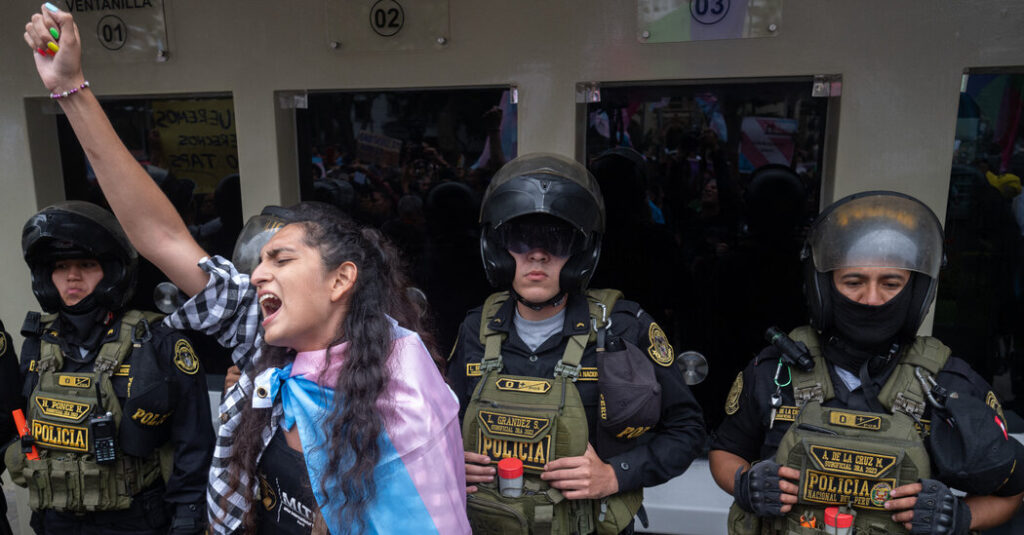The bulletin was published without much attention in Peru's official government newspaper, which publishes new laws and regulations, and Peruvian health officials said they had no idea the reaction it would spark.
They say they want to expand access to mental health care for transgender Peruvians covered by private insurance, which is why government decrees now include language classifying transgender identity as a “mental health issue.”
But as news of the ban spread, it sparked outrage among LGBTQ people and advocates across the country.
Many critics said the rule was another blow to a country where same-sex marriage and civil unions are illegal, transgender identity is not legally recognized, there are no hate crime laws and transgender Peruvians say they face widespread discrimination and violence.
“What they're doing is branding an entire community as sick,” said Christian González Cabrera, who studies LGBTQ rights in Latin America at Human Rights Watch.
But health officials said the anger and backlash was the result of poor communication and that there was no intention to offend transgender people.
This month, the Peruvian government added seven diagnostic codes from the World Health Organization's medical classification system to the list of diseases that must be covered by private and public insurance in Peru.
However, the law used wording from an older version of the WHO classification system, listing “transsexualism” and “gender identity disorder” as “mental and behavioral disorders.”
The WHO's new system, which came into effect in 2022, replaced these terms with “gender nonconformity in adolescence and adulthood” and “gender nonconformity in childhood” in a chapter titled “Conditions related to sexual health.”
According to the WHO, the change was intended to reflect “current knowledge that transgender-related and gender diverse identities are not symptoms of a mental illness, and that labelling them as such can carry significant stigma.”
Peruvian health officials said in interviews they were aware of the WHO changes but had only just begun the process of adopting them and implementing the new rules because of bureaucratic obstacles.
“This is a path we have already begun,” said Henry Horna, director of communications for Peru's Health Ministry, but officials did not say how long the process would take, so for now the current classification will remain in place.
In response to the uproar, the ministry issued a statement saying, “Gender and sexual diversity are not illnesses,” making clear its stance of rejecting discrimination.
Dr. Carlos Alvarado, the ministry's director of health insurance, said the regulation is aimed at making it easier for people to bill insurers for medical treatment related to their transgender identity.
“I honestly didn't expect this kind of reaction,” he said.
“The problem clearly stems from a misunderstanding of the meaning of the rules,” Horna said. “The rules are written in legalese, cold language, technical jargon.”
But transgender activist Leila Huerta said access to private insurance is irrelevant for most transgender people in Peru because many private employers have discriminatory hiring practices.
She said the benefits to the transgender community were outweighed by the stigma caused by the language used in government restrictions.
Activists and experts say classifying transgender people as mentally ill could encourage some conservative groups to promote conversion therapy, a widely condemned form of treatment that aims to change a person's gender identity or sexual orientation.
But health officials said transgender identity is not a mental illness and pointed to previous government guidelines not recommending conversion therapy.
The current dispute is just one of many struggles to expand gay and transgender rights and health care across Latin America, a region where violence against LGBTQ people is common.
Yet even in this environment, Peru stands out because its legal system gives few rights to gay and transgender people, Gonzalez said.
Same-sex marriage has been legal for years in other South American countries, including Brazil, Colombia, Chile, Argentina and Ecuador. “Peru is far behind its South American neighbors,” Gonzalez said.
Testifying before Peru's Congress last year, the Peruvian government's human rights chief called homosexuality “a deformity that must be corrected.”
And last year, a transgender woman working as a prostitute was kidnapped and shot 30 times in the streets of Lima in a murder that was recorded on video. One arrest has been made but a trial has yet to take place.
The Peruvian government does not collect data on prejudice or acts of violence against transgender people.
But a 2021 study by the Peruvian human rights group More Equality found that in a survey of 323 LGBTQ people in Peru, 83 percent said they had experienced some form of verbal or physical abuse, and 75 percent said they had experienced discrimination.
Alexandra Hernandez, president of More Equality and a psychologist, said she believes some Health Department officials issued the rule with good intentions but failed to consult with LGBTQ mental health experts.
“They say it was beneficial for us,” says transgender activist and journalist Gianna Camacho Garcia, “but the truth is that the benefits were minimal compared to what we would lose in other areas and aspects of our lives by calling us mentally ill.”



